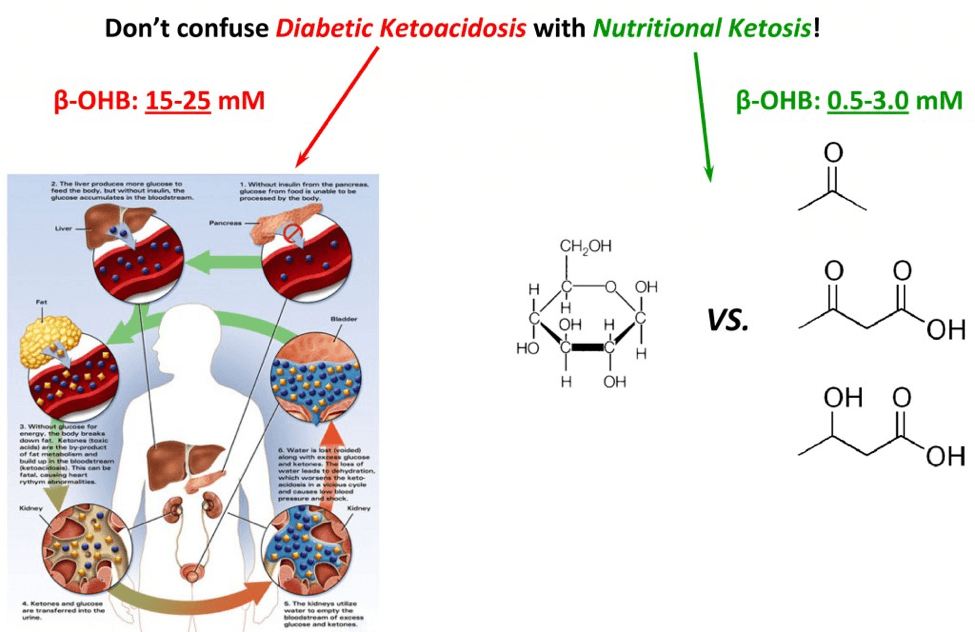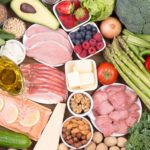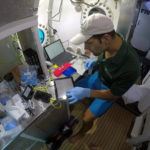You may have heard from your doctor that ketosis is a life-threatening condition. If so, your doctor is confusing diabetic ketoacidosis (DKA) with nutritional ketosis, or keto-adaptation.
First, some semantics. Our body can produce, from fat and some amino acids, three ketone bodies (a “ketone” refers to the chemical structure where oxygen is double-bonded to carbon sandwiched between at least 2 other carbons). These ketone bodies we produce are: acetone, acetoacetone, and beta-hydroxybutyrate (B-OHB). [For anyone who is interested, they are the 3 most right structures on the figure, below.]
Why do we make ketones? For starters, it’s a vital evolutionary advantage. Our brain can only function with glucose and ketones. Since we can’t store more than about 24 hours’ worth of glucose, we would all die of hypoglycemia if ever forced to fast for more than a day. Fortunately, our liver can take fat and select amino acids (the building blocks of proteins) and turn them into ketones, first and foremost to feed our brains. Hence, our body’s ability to produce ketones is required for basic survival.
What is diabetic ketoacidosis? When diabetics (usually Type I diabetics, but sometimes this occurs in very late-stage, insulin-dependent, Type II diabetics) fail to receive enough insulin, they go into an effective state of starvation. While they may have all the glucose in the world in their bloodstream, without insulin, they can’t get any into their cells. Hence, they are effectively going into starvation. The body does what it would do in anyone – it starts to make ketones out of fat and proteins. Here’s the problem: the diabetic patient in this case can’t produce any insulin, so there is no feedback loop and they continue to produce more and more ketones without stopping. By the time ketone levels (specifically, beta-hydroxybutyrate) approach 15 to 25 mM, the resulting pH imbalance leads to profound metabolic derangement and the patient is critically ill.
But this state of metabolic derangement is not actually possible in a person who can produce insulin, even in small amounts. The reason is that a feedback loop prevents the ketone level from getting high enough to cause the change in pH that leads to the cascade of bad problems. A person who is said to be “keto-adapted,” or in a state of nutritional ketosis, generally has beta-hydroxybutyrate levels between about 0.5 and 3.0 mM. This is far less than the levels required to cause harm through acid-base abnormalities.
Keto-adaption is a state, achieved through significant reduction of carbohydrate intake (typically to less than 50 grams per day) and moderate protein, where the body changes from relying on glycogen as its main source of energy to relying on fat. Specifically, the brain shifts from being primarily dependent on glucose, to being primarily dependent on beta-hydroxybutyrate. This has nothing to do with what a diabetic patient is experiencing in DKA, but does illustrate how poorly informed and quick to react the medical community is. DKA and nutritional ketosis (or keto-adaptation) have as much in common as a house fire and a fireplace.
Photo by Andrew Yardley on Unsplash








I am curious to know what effect a ketogenic diet has on someone with stage 4 cirrhosis of the liver, I have been trying to find documented research on this and keep coming up empty handed. I was told since 2005 I had fatty liver then I was told a few years later that I no longer had it. I had an Ultrasound done Jan 2014 that showed I had fatty liver again, was diagnosed type 2 diabetic Sept 2014 drastically cut my carbs and ended up doing ketogenic in May 2015, Nov 2015 diagnosed with stage 4 cirrhosis. Did this ketogenic diet contribute to my liver disease advancing to cirrhosis stage I am having a really hard time digesting fats I’ve had to up my carb intake to because of this. Please I really want to see research for this
I do not know the answer to this question. Certainly fatty liver (NAFLD) can ebb in and out, and we suspect this can even happen for NASH, but I have never heard of this once a person progresses to cirrhosis.
Thanks for the article. I’m in ketogenic diet for 14 days. Today, I tested my ketone level in urine, and it seems to be around 80 mm. So I decided to increase my daily carb intake from 15 gr to 50 gr. Can that be useful for lowering keton level a bit? 80 mm keton is dangerous? Im not a diabetic ill. I lost 6 kg within 14 days. That was a very fast fat loss
Hi, can you please point me to a link that is a good explanation of how diet-induced ketosis (long term) effects body chemistry?
Does diet induced ketosis slow the metaboilsm?
Can you please point me to a link that explains what happens to the metabolism during ketosis?
I am especially interested in this relating to hashimoto’s and hypothyroidoism; (a slower metabolism and slower digestion are already in place)
Thank you 🙂
Dear Doctor,
I have read and learned a lot from you, so I am hoping now you could answer my question.
Every time I do low carb, and do a workout, I become hypoglicemic shortly after (headacke, nauseous, blured vision…). That leads me to the question: is it impossible to have longer intense workouts at low carb diet, as it will lead to usage of all glicogen? Or I have a problem with hypoglicemia in some eay, since this happens every time I eat less than 50g of carbs and do a workout?
Much appreciated fast answer!
Hi Peter,
I have several family members on the ketosis diet doing very well. I ask my health care practitioner about getting on the diet and she said that it is hard on your liver and didn’t think it would be good for me at the time as I have had Hep C for 25 years and will be going on the drug Harvoni for 8 weeks to clear the Hep C .All my blood work came back in normal range except a little high on the LDL cholesterol 164 and above average HDL 66 and liver fibrosis just slightly above normal.
Question 1: Is ketosis hard on your liver and kidneys?
Question 2:Is there any papers or research I can bring my HP to show her that’s provesotherwise?
Thanks so much,
Lorine
Lorine, I have not seen data on ketosis and hep C.
I have been on a medically supervised (by my doctor), low carb life-style change for four months, since my doctor found my A1c level to be 5.8 and fasting glucose at 105. I also need to lose 40 pounds. I’ve lost 18 so far, and my A1c is now at 5.3 and fasting glucose is 99. This really works! I have more energy and sleep better on this (could be the weight loss?). It’s my new norm and I’m pretty happy with it.
I will continue to read your blog and get insights as to the mechanics of this. Very fascinating!!
I just started the ketogenic diet this past Sunday in the hopes it would reduce my belly fat and high cholesterol. I had routine blood work done yesterday and the Dr.’s office called this morning saying my liver enzymes with elevated and my cholesterol went up. Although I wasn’t told which went up. Is this what I should expect this early in the diet? Yesterday I was only in mild ketosis and moderate ketosis this morning. Do I need to worry about my liver and cholesterol? I am eating only high quality organic fats with poultry and seafood.
I’d like to add that I have no gall bladder so I am aware I need to add some digestive enzymes to help digest the fats. Could this be why the enzymes are high?
Hello there,
I started to eat keto 8 days ago
My mmol/l went up from 0.5 in the beginning( being on a veggie diet for the last 2 years, lots of non starchy vegetable, good amount of nuts and super little protein) to day 6 my ketones went up to 3.6 mmol/l and glucose 3.7. Day 7 went to 4.6mmol/l and 3.5 glucose. This morning day 8 my ketones are 6.3mmol/l and glucose is 3.8. I’m eating 200+g of fat, coconut oil, butter, my carb is a bit low with 15-20g coming from spinach, garlic, cabbage, proteins around 40g from eggs and fish. I’m a bit worried and will continue to check. Any idea what is going on??
Super newbee
Angelina
Hi Peter,
Thanks so much for this article. I am writing an eBook on Nutritional Ketosis and this article provided me with a very clear, well understood explanation of ketosis. Thanks so much for sharing! You’re welcome to explore my nutritional site and blog at http://www.eatprimalfoods.com. Thanks again Peter.
Dr Attia,
I went to ketosis a few weeks ago and I think I have know fully transitioned.
I started again my endurance training (trail running) 3 weeks ago. The 2 first weeks were tough most probably because this is new to my my body.
The last week was quite fun with good sensations. However, I am monitoring my resting HR every morning since the beginning of the training and I noticed my resting HR increased by ~ 15 pulse ! When trained, I was used to 45 bpm and it’s now 60!
Is that something we are expecting to see when in ketosis ?
Am I doing something wrong ?
What would be your advice ?
Thanks
Sebastien
Someone help. I am so frustrated. I’ve been eating less than 20 carbs/day. I’ve been relentless on eating high fat, lower protein and bare carbs. I can’t loose weight. What am I doing wrong? Do I need to cut out the fat from dairy? I’m menopausal but can this be why I can’t drop the weight? Ugh… Any advise?
Teresa
Dear Peter,
I’m from Croatia and my english isn’t well, but I hope you’ll understand me. I’m 50, extremely active (mountaineer, free climber, bicycling 15-25 miles per day, badminton player…) and completely healthy except my tennis elbow on both arms for last 9 years. I’ve done MRI and both tendons are partially pulled out (partial avulsion) and every year or two I have to rest at last 3 months, do rehabilitation exercises and wait that inflammation calm down. I’ve red that keto diet can help with inflammation because bacterias that cause inflammation can’t feed without glucosis. Do you know anyone with chronic tendon problems and is it possible to accelerate healing with keto diet?
Thanks,
Roberta
Dr. Attia,
It is my understanding that the liver can not process ketone bodies for its own use.
If that is true how does the liver receive its nourishment during ketosis?
Thank you.
The liver turns out not to need a huge amount of energy. Even in starvation, it can derive energy from “manufactured” glucose via glycerol, which is necessary for part of the brain’s needs.
Wow! Keto is powerful stuff. I’ve stuck to a low carb diet for many years but the other calories were mostly protein. Decided to try the keto diet. Here’s my thoughts
1) Some sites cite 20-30% suffering from Keto Flu. I think its closer to 100% – I think the lower numbers are those thinking they are ketogenesis when they are not. I got carbs below 50g for a couple weeks and thought I was in keto state based on urine test strips. It wasn’t until I reversed my protein/fat from 2/1 protein/fat to 2/1 fat protein. Then it hit! Its a major body change. The stomach cramps have been horrible!
2) the ill affects of the switch to fat-burning have been compensated by some stunning changes. My mental alertness is incredible – higher than ever in life. The dreams are INCREDIBLE. For a week straight I have vivid dreams seeming all night long that I remember. I’ve done a lot of reading on lucid dreaming and done some things to encourage it with little success. Once I went into true ketosis the dreams became stunning.
3) I’ve always thought positively of olive oil and good fats, however the idea of literally drinking oil was a hard change. I do a shot of olive oil first thing when I wake. Seems to soothe the stomach and probably provide nutrients for biotics. I also cam up with a treat that got me through the keto flu
About a 1/2 gallon to a gallon of filtered walter
whole bag of frozen spinach – broken into small bits
Braggs amino acid – soy sauce alternative – 2 tbs
soup stock to your liking
sea salt if needed
1/2 cup to a cup of unsalted butter (depending on your fat needs)
boil and enjoy! WIll last a few days depending on your intake
Dr. Attia,
On August 1 of 2016,one month before my 66th birthday, I started a LCHF diet after many years of going up and down with my weight and definitely on the wrong road health wise. I weighed 194.6 and today I weigh 173 lbs. All of this in 10 weeks.I can wear clothes now that I haven’t worn this century!
The reason it has worked for me is that the science that you and your colleagues expound upon is correct and easy to apply. I can’t understand for the life of me why it isn’t mainstream. It does have its “rocket science” side but also it has the “paper airplane” side as well as I was able to start and get positive results before understanding the science behind it. Can it really be as simple as it was for me? I believe so honestly. I would like to end with a heartfelt(pun intended)thank you to you and all of your colleagues for all of what appears to be a tireless effort to assist people like myself.I was told something by a friend that I have never been told in my life. That I was skinny.
As a former Marine with 2 tours in Viet Nam and entering the final stretch I can’t thank you and your colleagues enough as I now know what to do and how to do it. Keeping it is up to me.No excuses now.
Semper Fi
Andy Langley
Hello, I’m a type 1 diabetic and I’ve been on a slow carb diet (whole gains) at a macro ratio of 50 carbs 30 protein 20 fats. I’ve just discovered keto. I’m excited to try this but fearful at the same time. What do I do if my blood glucose drops below 100 ? What do type 1s need to focus on to make keto work and stay healthy?
Re: This does illustrate how poorly informed and quick to react the medical community is… :
They might be reacting quicker than you think – Might it have more to do with the AMA and friends in DC, the grain and sugar lobbyists… I suppose they have time to talk with each other while waiting for an opportunity to meet with our political leaders. Just think of all those “fat-free” products in the supermarkets, the huge bread isles… not to mention doctor visits and pharmaceuticals that treat the multitude of dietary-caused ailments.
This is really a great blog of interesting information about ketosis. I have just started in this realm of ketosis and would like to understand more of where is it dangerous? If I am adding ketones into my system to induce ketosis this should be a good thing correct? I feel great losing weight and sleeping like I never have before. My concern comes to when are there to many ketones and what happens then? I am taking a supplement that induces ketosis very quickly but is there a point that this is to much? There are so many ways your health can go south so where is the happy medium. Where can I find a real ketogenic diet plan that I can follow.
Dear sir Peter Attia
Is it ketosis safe for long term. Like lifetime.?
HI Peter Attia,
I have been in keytosis 24/7 for the past 3 months and on the urine strips where you can check your levels i am always on 4-5 could be slightly more as it instantly changes to dark purple sometimes almost like black. I do drink plenty of water. My question is could body have too much acidosis if i continue this state for a longer period? How will acidosis work i have heard this is produced simultanously with ketosis. I fear that too much acid will build up overtime and cause my hormone activity to drop leading to possible death. Drinking water to flush keytosis out will this also flush the acid at the same time or will this be stored? Please if you could explain this i would really appreciate it. I do not want too much acid building up in the blood. Are my levels safe?
Kindest Regards
Faheem.